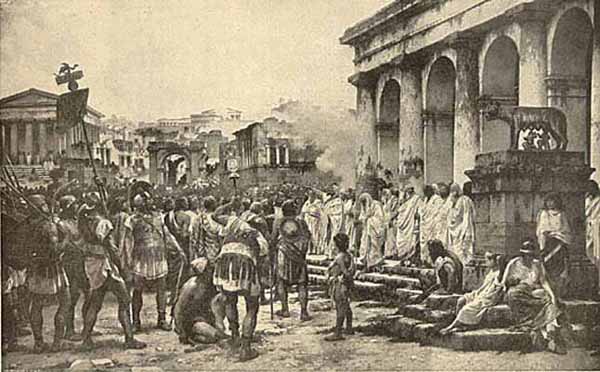Last week, we looked at the pros and cons of Athenian
Democracy. Today, we’re going to look at Roman Republicanism. By the end of
this post, we should have a better idea of the differences between the two
forms of government.
While Athens and the rest of the Greek city-states were developing
their cultures and forms of government, another civilization was developing in
Latium at the center of Italy. The city of Rome grew on the banks of the Tiber
around farming communities and traders. At the center of society was the
family. In contrast with Greek emphasis on commitment to the state, Romans were
devoted to their families and an honest agrarian lifestyle. This Roman outlook
created a very conservative and pious society. It was only natural for a
conservative form of government to rise in this atmosphere.
The ruling body of Rome was a council of elders called the
Senate. Its members were comprised of the richest and oldest of the city’s
citizens and they determined the city’s policies. Senators were not elected; rather,
office came from being born into a patrician family. As a sort of executive
branch, two senators were elected as consuls for a year. During their term in
office, the consuls would lead the legions of Rome into battle. Eventually, a
popular Assembly was created to voice the concerns of the people. The Assembly
would elect Tribunes who would represent the people to the Senate. Every free,
land-owning citizen could vote in the Assembly and it became the popular body
of government. Thus, the government of Rome was indirect rule of the people.
Some things would be changed by popular vote, but for the most part, the power
rested in the unelected Senate. The Senate and Assembly worked together in
relative harmony until the Gracchi brothers introduced reforms and land redistribution
for veterans.
Gaius and Tiberius Gracchus were two Senators who took up
the cause of veterans of the Punic and Macedonian Wars. Many veterans were
taxed out of their homesteads during the wars and had to try to find work in
the city. This population influx caused rapid unemployment and rioting.
Eventually, the Gracchi brothers introduced legislative reform that was passed
due to the backing of the popular, now riotous, Tribunes. Conservative elements
in the Senate had the Gracchi brothers killed and repealed the reforms, but the
popular voice was too strong. The common people demanded change.
During the years following the death of the Gracchis,
several dictators rose to power and began to use their control of the legions
to take over the entire system of government. First was Marius, then Sulla, the
First Triumvirate, and ultimately Gaius Julius Caesar. After Caesar, the
republican form of government was supplanted and overseen by an emperor.
Consequently, the weakness of the Roman republican system was that there was no
check on executive power since it controlled the military and the purse. This
led to the merging of the executive and legislative branches, creating the office
of imperator, or emperor.
We can see, then, that democracy and republicanism have
similarities, but also have many differences. In a pure democracy, like Athens,
the people vote on every issue and decide everything in a popular assembly. In
a republic, like Rome, it’s a mix of popular government, like the Assembly, and
an unelected body of elders, the Senate. Although both forms of government
failed due to the inherent flaws in each system, Athenian democracy ruined that
state much faster. As we saw last week, Athens quickly fell to outside powers
and had to live the rest of its existence out of the spotlight. Rome, on the
other hand, kept parts of its republic even into the imperial age, and we all
know how long and glorious that was.





